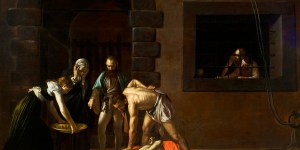Jesus upended our expectations when he spoke about the total inversion of power in the Kingdom of Heaven.
Those who live by worldly measures of success -- the greedy, warlike, and aggressive -- seize and keep power for themselves. But in the Kingdom of Heaven, the peaceful and selfless come first and “the meek will inherit the earth” (Matt 5:5).
It can be hard to imagine this upside-down ranking, but Jesus often used stories to help us understand his Kingdom. We also have the stories of the saints to show us what it looks like when we set our hearts in the Kingdom.
St. John the Baptist’s story is especially worth studying. Can we reasonably call John the greatest man who ever lived prior to Jesus? After all, Jesus said of John, “Amen, I say to you, among those born of women there has been none greater than John the Baptist” (Matthew 11:11).
What true greatness looks like
How did this greatest of men spend his time on earth? In radical humility, selfless service, and a total eclipse of self to make space for God’s will.
In the eyes of the world, Jesus seemed to be edging in on John’s territory. But John always understood that humbly making room for Christ was his mission, as stated in the Office of Readings:
With unequaled courage (John the Baptist) spread the news that he, the greatest of all men, was the least in the kingdom of heaven. His disciples, and the devil, would have preferred him to fight, to build his sect, to defeat this upstart whom he himself had baptized, to seize (Jesus') place in history. But (John the Baptist) did not – and so, rightly, he has his place, and he has glory in heaven.
This greatest of men saw his purpose not only as preparing for Christ but also as total submission to God’s will. He willingly devoted his life to preparing the way for Christ with no thought of himself.
The greatest as least and last
The greatest man was the most willing to forget himself completely. His story reveals a paradox of greatness: The higher a person is in the Kingdom of Heaven, the more willing they are to be lowly on earth.
Jesus told us this himself. Often, he said things like, “For the one who is least among all of you is the one who is the greatest” (Luke 9:48) and “the last will be first, and the first will be last” (Matthew 20:16). But those stories help us understand, and John lived out this willingness to be least and last.
What if we measured greatness not by worldly power but by pursuing God's will wholeheartedly? Then we would know what it means to live with the Kingdom of Heaven in our hearts now, while we’re on this earth. St. John the Baptist shows us how.



